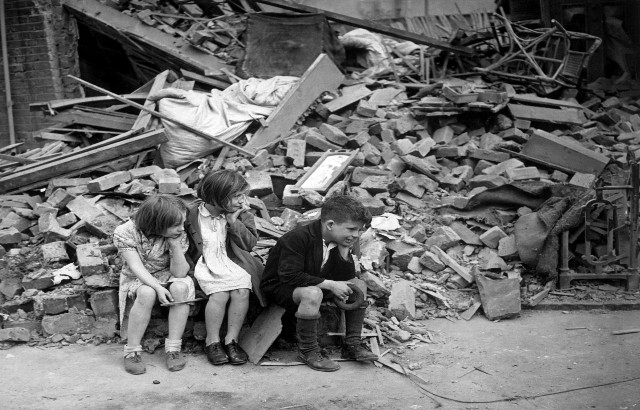What the aftermath of war can teach us about the Covid-19 crisis
Britain’s War: A New World 1943-1947 is the first book of its kind to bring the military, political, social and economic realities of World War II together in one volume.

Children sitting in rubble
As the 75th anniversary of VE Day is celebrated, a new book, Britain’s War: A New World 1943-1947, by Professor Dan Todman from Queen Mary’s School of History explores the reality of war and how people felt at the time.
Professor Todman argues that 1945 was remembered not just as a moment of military victory but also of decisive political change. The book builds on his previous work, published in 2016, which focused on Britain’s role in the first part of World War II.
Impacts felt for years to come
The book provides unique insights into how and why Britain ended up on the winning side of World War II and sheds new light on the grim reality of both military and civilian deaths.
Professor Dan Todman, Professor of Modern History and Head of the School of History at Queen Mary said: “The book has relevance for today given the dramatic upheaval and tragic loss of life during the current Covid-19 crisis – and the way in which references to the war has been used to try to influence behaviour in the present day. Just as with the war, the impact of the crisis will not be limited to the immediate struggle with the virus, but will be felt deeply in years to come.”
Involving two decades of research, including using conventional archives, contemporary newsreels and diaries, state surveillance reports the latest book tells the story of how Britain changed during the initial post-war years which followed the VE Day celebrations.
An uncertain post-war future
The volume explores the degree to which the burden of the conflict was borne by British women as well as how Britain’s high-technology approach to war changed the typical experience of men and women in combat. Professor Todman explained: “The war affected generations of peace around the world. To understand the uncertainties of ‘peace’, this book carries the story on to 1947, encompassing the difficulties of demobilisation, the end of empires and the social change which followed.”
The work also examines the calls for social justice which became stronger in the aftermath of the war as well as Churchill’s failure to grapple with the reality post-war reconstruction, which resulted in defeat at the 1945 general election. Wider social issues are also confronted including racism, poverty, antisemitism as well as the UK’s alliance with totalitarian USSR.
“I am delighted that the reviewers have recognised this work as a colossal academic achievement, which has been achieved thanks to the brilliant support I have received from the Queen Mary’s School of History,” said Professor Todman.
“The period 1942-47, the long endurance of the hard slog of the middle of the war, and the ugly compromises that had to be made, are much more relevant to our current situation today than short-lived drama of the Blitz or the Battle of Britain. Comparisons between this second half of the war and the current moment might also help us to think about the importance of offering a vision of what comes next if people are to be motivated to endure long struggles,” he added.
More information
Britain’s War: A New World 1943-1947 has been reviewed by The Telegraph, Wall Street Journal, The Times, The Express, The Spectator and you can also read Professor Todman's piece in The Guardian.
- Study History at Queen Mary
- Read more about Britain’s War: A New World 1943-1947 which is out now.
Related items

23 July 2025

17 July 2025
For media information, contact:
